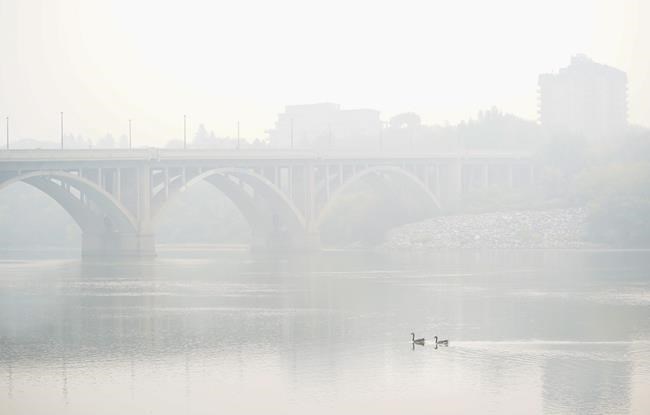
In this file photo two Canada geese swim as the South Saskatchewan River is enveloped by forest fire smoke in Saskatoon, Sask., on Sunday, September 3, 2023. The leadership of a Saskatchewan First Nation is calling for help hours after issuing an evacuation order due to an escalating nearby wildfire. Officials with the Peter Ballantyne Cree Nation are asking the Saskatchewan Public Safety Agency for immediate action and accountability in response to the Flanagan fire, which has forced the evacuation of Sandy Bay. THE CANADIAN PRESS/Heywood Yu
Republished August 14, 2024 - 4:57 PM
Original Publication Date August 14, 2024 - 11:26 AM
SANDY BAY, SASK. - The Saskatchewan Public Safety Agency says crews have spent more than a month fighting an escalating fire near Sandy Bay, Sask., a day after area residents were ordered to evacuate and in the face of accusations it didn't act sooner.
The agency said Wednesday it has worked to suppress the fire near the community in the province's northeast since July 10. It said it has also used helicopters and air tankers.
"The SPSA is putting all possible resources toward wildfire suppression efforts," it said in a statement.
On Tuesday, officials with the Peter Ballantyne Cree Nation said the agency has refused to hire hundreds of qualified First Nations firefighters due to a lack of proper equipment.
Chief Peter Beatty said First Nations have access to the necessary gear, including hats and boots, and are also properly trained, but the agency is not deploying them.
"These are well-trained firefighters and they know what they're doing out there," he told reporters.
"In the interest of public safety, would you not put the fire out when it's at a very small beginning stage to prevent this type of thing happening where people have to be uprooted?"
Duane Hiebert, emergency response manager for the First Nation, said the province missed a chance to control the blaze.
"It hasn't always been burning as vigorously as it is within the past couple of days. They had ample opportunity along various parts of the fire line to contain the fire when it was much smaller, but they didn't take advantage of it at that time," he said.
"Even some of their own staff are calling it a sleeping bear, and now it's reached the size where it's not safe to put any firefighter on because it's so hot."
Hiebert said 300 people have already evacuated the community and are staying in Prince Albert, Saskatoon and Regina. Hundreds more are expected to leave in the coming days.
He said the fire, about 130 square kilometres in size, is seven kilometres from the village. Unfavourable winds are expected to push flames closer, he added.
The Saskatchewan Public Safety Agency said the fire poses a risk to a provincial power station near the community. It has identified the cause as lightning.
Sandy Bay is about 430 kilometres northeast of Saskatoon near the Manitoba boundary.
"The SPSA assesses every wildfire and decides the best way to manage each fire," it said.
"The SPSA’s priorities include protecting, in order, human life, communities, major public infrastructure, commercial forest and other values."
Beatty said there seems to be a lack of commitment.
"We cannot stand by while excuses are made. Our people are ready to protect their land, but they are being denied the opportunity because the SPSA isn't prioritizing the resources needed to ensure their safety," he said.
"It feels like they do not want to put the fire out."
Grand Chief Brian Hardlotte of the Prince Albert Grand Council said Saskatchewan's approach to fighting fires disregards northern First Nations communities.
"This isn't just a policy failure; it's a failure of leadership and moral responsibility of the provincial government. Prioritizing economic considerations over human lives and environmental protection is both short-sighted and dangerous," he said.
"These aren't just remote forests — they are our homes, our sacred lands and our future. To let them burn without doing everything possible to extinguish the flames is an unforgivable betrayal of our trust."
This report by The Canadian Press was first published Aug. 14, 2024.
— By Jeremy Simes in Regina
News from © The Canadian Press, 2024